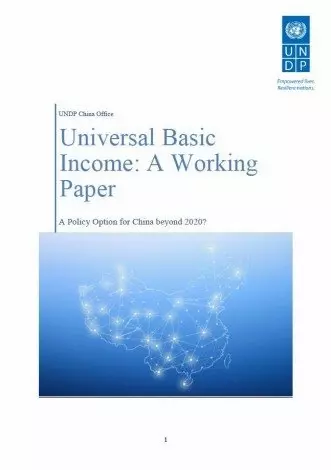Universal Basic Income in China
UNDP Beijing
"Universal Basic Income in China", UNDP Beijing, China Institute for Income Distribution of Beijing Normal University
This UNDP China report investigating the potential for UBI in China finds that the current system of subsistence allowances is more effective than UBI, due to subsistence allowances covering 53m people, whereas a UBI would need to cover 1.4bn people. A summary table 3-2 (p30) compares UBI and targeted poverty alleviation against a number of criteria. The report also includes a review of UBI pilots in other countries eg USA, Finland, India etc.
The authors take the view that UBI would have to be tax financed, stating that ‘general tax revenue will need to serve as the source of funding’ (p5). They also identify strong Chinese cultural reasons in support of UBI beyond considerations of rational financial calculation, namely the avoidance of social stigma and enhanced dignity and self-respect attached to a universal benefit, and the cultural respect for ‘hard work’ which leads to likely low labour supply effects from UBI. An analysis of work also needs to include the likely reduction in work requirement as production is increasingly automated. Making work the objective of welfare policy may prove to be mistaken as work and wage become less reliable as the source of adequate household income, requiring complementary UBI.
A questionnaire and an innovative on-line game were used to research popular response to a UBI proposal. 96% of questionnaire respondents favoured UBI, 88% voted for its highest level of >2,500 yuan/month, 82% would not change their work practice, most would either save the UBI or spend it on children’s education or care for parents. A reservation with all such popular surveys is the specific understanding of UBI and its consequences which respondents have in mind. The risk is that surveys can therefore build intricate statistical analyses on shaky foundations.
The report does not consider the important macroeconomic possibilities for UBI in China. China produces goods for global consumption, funding this in the case of the US market by purchasing US Treasury bonds. China can therefore by definition produce for its own population to meet the demand enabled by a UBI scheme, and can fund this by issuing debt-free sovereign money instead of purchasing US Treasury bonds. General taxation is therefore not the only source of funding UBI. The potential for debt-free sovereign money funding of a substantial UBI therefore needs to be analysed.
The report is available here.
Geoff Crocker
Editor ‘The Case for Universal Basic Income'
www.ubi.org

